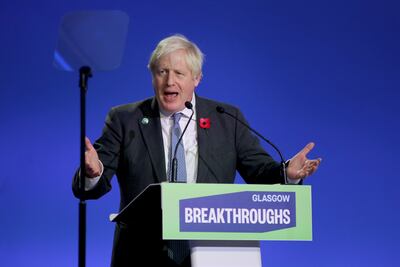UK Prime Minister Boris Johnson has set out the first five steps of an agenda to deliver clean and cheap technology across the world by 2030.
His “Glasgow Breakthroughs” have been backed by 40 countries, including the UAE, and will include close co-operation between the private sector and governments to accelerate innovation and scale up green industries.
The first steps, set out at Cop26, will focus on five major areas, which comprise more than 50 per cent of global emissions.
The five steps
By 2030, those countries involved in the process will ensure that:
· clean energy becomes the most reliable and affordable option
· zero-emission vehicles becomes the “new normal”
·near zero-emission steel becomes the preferred choice
·low-carbon hydrogen becomes cheaper and globally available
· climate-resilient, sustainable agriculture becomes the most attractive option for farmers.
“By making clean technology the most affordable, accessible and attractive choice, the default go-to in what are currently the most polluting sectors, we can cut emissions right around the world,” said Mr Johnson.

“The Glasgow Breakthroughs will turbocharge this forward, so that by 2030, clean technologies can be enjoyed everywhere, not only reducing emissions but also creating more jobs and greater prosperity.”
It is hoped that by delivering on the five steps, some 20 million new jobs will be created globally and more than $16 trillion in both emerging and advanced economies will be generated.
“Climate Champions” Gonzalo Munoz and Nigel Topping were among those to back the move.
“With key private sector actors mobilising behind the breakthroughs necessary to achieve a net-zero world in time and world leaders signing up to the breakthrough agenda, governments across the world will help dramatically scale and speed up the race to zero emissions and deliver the promise of the Paris Agreement,” they said.
“This is what the future of Cop is all about — catalysing an innovative ambition loop between political leadership and the dynamism of the private sector to drive towards a resilient, prosperous, zero-carbon future.”



















